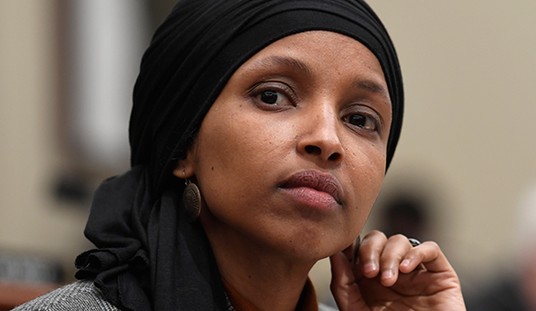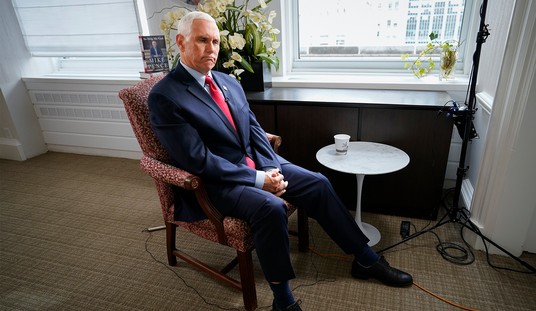Leave it to Salman Rushdie to bring back the Left’s favorite stratagem: moral equivalence. During the Cold War, leftists used to say the following: “Sure, the Soviets are doing bad things, but so is the United States.” Those a bit more to the left would advance the argument, and say: “The Soviets do terrible things, but the U.S. is responsible, since its leaders view them, as Reagan did, as ‘the evil empire.’ Since we won’t accommodate their just demands, they have to respond to us with hostility.” Those even further to the left would push the analogy even further, arguing: “The Soviets may do some bad things, but at least they stand on the side of progressive change. The U.S., on the other hand, oppresses Third World peoples and supports right-wing reactionary regimes all over the world.”
A good example of the old moral equivalence was to equate the Gulag in the Soviet Union, in which hundreds of thousands were imprisoned, starved to death and executed in massive frame-ups, with McCarthyism in the United States. During the so-called McCarthy era, relatively few were imprisoned or lost their livelihoods, and many actually guilty of being actual Soviet agents portrayed themselves as innocents accused because of their political views. Yet the Left in America argued both were the same.
Now Salman Rushdie has a lot to be wary of. After the Iranian revolution, the late Ayatollah Khomeini issued a fatwa along with a reward for anyone who murdered him. Because of his novel The Satanic Verses, Rushdie had to go into hiding in different safe houses for a number of years, while under the protection of the British government. Intellectuals and writers in the West rallied to his defense. Eventually, Rushdie came into the open, moved to the United States, and became a favorite in the celebrity world, as well as a best-selling novelist.
In his New York Times op-ed last week, Rushdie complained that political courage is “almost always ambiguous,” and that those who stand against abuses of power or dogma are viewed suspiciously. Chinese dissidents are deemed subversive by the state’s Communist leaders and are imprisoned; critics of Putin in Russia like the women’s band “Pussy Riot” are sentenced to prison terms and are viewed as improper by the Russian public; and a Pakistani governor who defends a Christian woman sentenced to death for blasphemy ends up murdered by his own security guards.
His examples are correct, and telling. Rushdie must identify with the plight of a Saudi poet and journalist who, he reports, tweeted something about Muhammad not liked by religious leaders in his country and, as a result, was imprisoned. But then, Rushdie writes the following, and it deserves letting you see his own words, because they are so preposterous:
America isn’t immune from this trend. The young activists of the Occupy movement have been much maligned (though, after their highly effective relief work in the wake of Hurricane Sandy, those criticisms have become a little muted). Out-of-step intellectuals like Noam Chomsky and the deceased Edward Said have often been dismissed as crazy extremists, “anti-American,” and in Mr. Said’s case even, absurdly, as apologists for Palestinian “terrorism.” (One may disagree with Mr. Chomsky’s critiques of America but it ought still to be possible to recognize the courage it takes to stand up and bellow them into the face of American power. One may not be pro-Palestinian, but one should be able to see that Mr. Said stood up against Yasser Arafat as eloquently as he criticized the United States.)
Let us take up his two major points. Occupy Wall Street protestors were handled by the authorities with kid gloves. When they took over the park in New York City over a year ago, although it was privately owned, they were allowed to camp out, disrupt and close down local businesses, and engage in anti-social and horrendous behavior — from public defecation to rape of women — without consequences. Rushdie mentioned Occupy for one reason alone: to show his heart is on the Left so that he can get his comrades in that camp to listen to him about how Islamists persecute those they disdain.
[jwplayer config=”pjm_lifestyle” mediaid=”40025″]
It is his second point that is most ridiculous. The truth, to use Rushdie’s words, is that Noam Chomsky in particular is a “crazy extremist.” If you have a doubt, I suggest you purchase a copy of the Encounter book edited by Peter Collier and David Horowitz, The Anti-Chomsky Reader, in which various authors make the case that Chomsky is basically a charlatan.
But even if that was not the case, Chomsky does not have to show much courage at all to take on all U.S. administrations and to oppose them as oppressors and imperialists. Indeed, he has become an international intellectual superstar, applauded and heralded by the Left at home and all of our enemies abroad, who shower him with high lecture fees and give him a gigantic audience abroad and at home. He is continually on the lecture circuit, has the support of both student audiences and assorted Hollywood and music world celebrities, and writes best-selling books, for which he has no problem finding a publisher. Bellowing “into the face of American power” is hardly an offense that has landed him even in any white-collar prison, not to speak of a Gulag or Gitmo.
[jwplayer config=”pjm_lifestyle” mediaid=”40024″]
As for the late Edward Said, his critique of “Orientalism” became the favored paradigm to explain U.S. policy in the Middle East, and influenced scores of leftist professors of Middle Eastern politics. As for his supposed standing up to the late Yasser Arafat, anyone who recalls what Said’s complaint about Arafat really was will remember that he was angry that Arafat appeared to play the game of engaging in negotiation with his enemies, rather than reject such posturing and commit himself exclusively to armed struggle against Palestine’s supposed oppressors. His former friend Christopher Hitchens pointed out in his own memoir that Said’s “low point was an almost uncritical profile of Yasser Arafat that he contributed to Interview magazine in the late 1980s.”
One might also recall Said’s trip to the West Bank during the first intifada, when he and his young son joined the mob in throwing rocks at Israelis, something of which he was quite proud. To Said, any action taken by Palestinians, no matter how violent, was “resistance.” Again, Hitch well summed up what Said believed, which was that “if the United States was doing something, then that thing could not by definition be a moral or ethical action.” And that is why Said eventually rejected Arafat. He thought that the PLO leader was heeding the agenda of the U.S., by his very action of negotiating with its leaders.
To equate those who are truly courageous — like the brave Chinese dissidents who risk their lives to speak up for democracy, or critics of radical Islam who speak up knowing what their future is likely to be if they live under the rule of Islamic regimes — with critics of U.S. policy who live in our democratic republic is more than preposterous. It is the opposite of moral courage. A man of words and letters, Salman Rushdie should by this time be able to know the difference.
*****












Join the conversation as a VIP Member